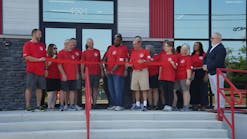It always happens to the other guy. It's always the other person who slips on the ice and breaks his leg, has a heart attack, confronts a child with grade problems at school, has his building burn down or faces the loss of someone they love. Until, of course, it happens to you.
It's axiomatic that few subjects are as important as disaster planning. Probably not one HARDI member would disagree. Yet, disaster planning remains one of the issues that we think about at times, feel a twinge of discomfort when something happens to someone we know (especially if they're in our industry) and is an issue that we might have taken some tentative steps to address. It doesn't take a high I.Q. to figure out why. Who wants to plan for a worst-case scenario, even when we know it's the right thing to do? It's a rather depressing thought.
New York University's Center for Catastrophe Preparedness and Response and The Public Entity Risk Institute, a nonprofit research organization, completed a study that examined the level of crisis readiness among government, business and nonprofit organizations across the United States. They concluded that “a large number of organizations lack effective preparedness programs to respond to and recover from a crisis despite estimates that crises to come may be more frequent and complex.”
By now, HARDI members know that every March we have a special issue devoted to a topic that we believe is important to their businesses. We rely heavily on our editorial board for direction and ideas. Last year, we focused on succession planning, and this year, we chose disaster planning.
Not even a special issue can answer or confront every question that you might face with such a serious topic. However, we believe that our contributors have provided enough of a landscape to give you a starting point for your own disaster planning. A disaster planning expert (formerly with the Federal Emergency Management Agency) provides an overview of the issue, and we have shared resources and websites to assist you with developing a disaster program.
As I noted earlier, it always happens to someone else, but that someone could actually be a fellow HARDI member. We're writing about the personal stories of members who, in fact, faced a disaster. I'm particularly thankful to Richard Cook with Johnson Supply and Frank Meier with Meier Supply Co. Inc. who shared their experiences. I suspect that no one really wants to talk about a personal disaster. But these gentlemen did so because they felt it might be an instructive lesson for all HARDI members. It was a thoughtful gesture, and I want to publicly thank them for their cooperation.
One last comment: While we focused on business disaster planning, keep in mind something that is terribly obvious, important and yet possibly overlooked. If your area suffers a disaster, your family and your employees' families face the same tribulations and dangers. You will have to deal with those issues as well as the ones that directly relate to the disaster plan for your business.
HVACR Distribution Business welcomes letters to the editor.
Please send correspondence to:
Tom Peric', Editor
2040 Fairfax Avenue
Cherry Hill, NJ 08003
856/874-0049 or
e-mail [email protected].








